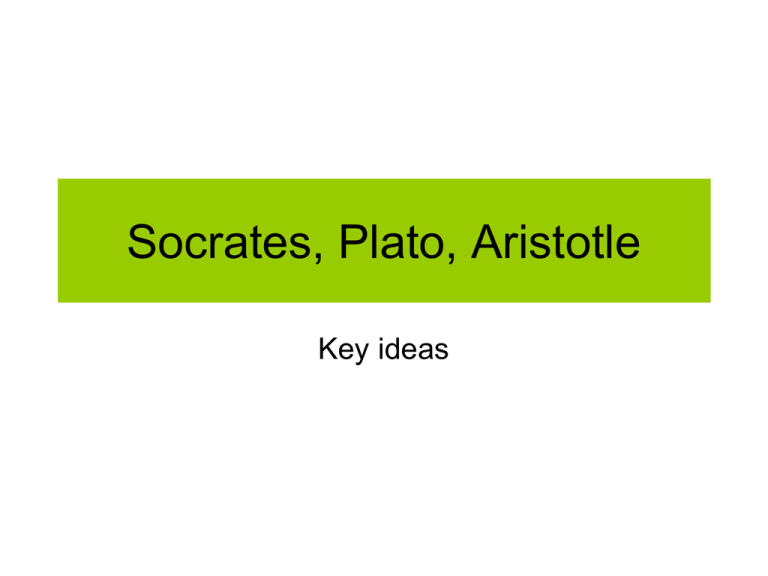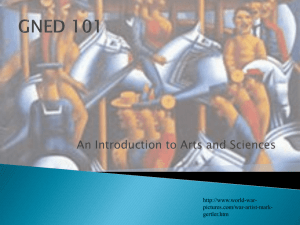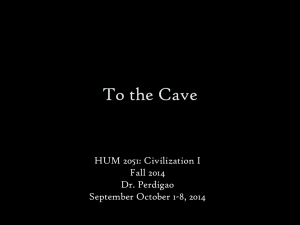Soc, Plato, Arist
advertisement

Socrates, Plato, Aristotle Key ideas Socrates (470 – 399 BCE) • concerned with ETHICS • The truth about how to live a good moral life: what is goodness, justice, temperance? • An action is right if it promotes our true happiness • True pleasure is attained through ethical living • Universal definition of justice The Death of Socrates by Jacques-Louis David See www.pima.gov/publicdefender/socrates.htm • Observe laws & limits to lead a good life • Dialogues – role of ignorant questioner to show experts their own ignorance (ideas of Socrates documented by Plato. Some of the most famous philsohical publications) • Care for the soul: gaining wisdom is key to a virtuous life & saving the soul • Knowing what is good = doing what is good The Death of Socrates by Jacques-Louis David See www.pima.gov/publicdefend er/socrates.htm Socrates continued: • In this painting, Socrates (470–399 B.C.), uncoerced and unshackled, freely prepares to die by drinking poisonous hemlock • The philosopher is condemned to die by the Athenian democracy for promoting skepticism and impiety (the Athenians were nervous about offending the gods) • Rather than flee the city, Socrates accepts his unjust punishment and sacrifices himself on abstract principle. • Nevertheless, Socrates shows nobility and selfcontrol in the face of death. See www.philosophypages.com • Socrates calmly sits upright with his finger extended in the air, exuding authority, responsibility, and intellect • Surrounding him are his students, most reacting emotionally Name Plato (Πλάτων) Birth c. 428–427 BC, Athens Death c. 348–347 BC, Athens PLATO School/tradition Platonism Rhetoric, Art, Literature, Epistemology, Main interests Justice, Virtue, Politics, Education, Family, Militarism Notable ideas Platonic realism Socrates, Homer, Hesiod, Aristophanes, Influences Aesop, Protagoras, Parmenides, Pythagoras, Heraclitus, Orphism Aristotle, Neoplatonism, Cicero, Plutarch, Stoicism, Anselm, Descartes, Hobbes, Leibniz, Mill, Schopenhauer, Influenced Nietzsche, Heidegger, Arendt, Gadamer and countless other western philosophers and theologians Plato (428 – 347 BCE) Knowledge through reason, the intellect – not the senses. Knowledge of reality & how we perceive it: what is whiteness, roundness, treeness? (Metaphysics – meaning and reality) Theory of Forms / Ideas: world of the senses / change / illusion / appearance / imperfect Vs the authentic world / ideas / unchangeable / spiritual / eternal Allegory of the Cave(https://www.youtube.com/watch?v=LTWwY8Ok5I0) Image courtesy of news.bbc.co.uk Plato asks the young girl in Sophie’s World (by Jostein Gaarder) to think about the following 4 questions, thereby engaging in philosophy: •Think over how a baker can bake 50 absolutely identical biscuits • Ask yourself why all horses are the same • Decide whether you think that [the human person] has an immortal soul • Say whether men and women are equally sensible Aristotle (384 – 322 BCE) Interested in scientific proof & principle of cause & effect Whiteness, treeness, justice etc exist – called these ‘forms’ Form and matter: recognises the essence of something & its physical manifestation: what makes me unique + the physical characteristics I exhibit. Both need each other. Form = what makes something what it is: whiteness, treeness, it is unchanging; matter = individual, particular, concrete, it changes. Knowledge begins with the senses. 2 ways of knowing: through the senses first + then through the intellect. We must use our senses as well as our intellect. Seasons: senses tell us there is change. Intellect tells us why. Within change there is stability and a foundation for scientific thought / principles Image courtesy of space.about.com




